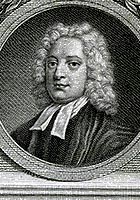A Night-Piece On Death Poem by Thomas Parnell
A Night-Piece On Death
By the blue taper's trembling light,
No more I waste the wakeful night,
Intent with endless view to pore
The schoolmen and the sages o'er:
Their books from wisdom widely stray,
Or point at best the longest way.
I'll seek a readier path, and go
Where wisdom's surely taught below.
How deep yon azure dyes the sky!
Where orbs of gold unnumber'd lie,
While through their ranks in silver pride
The nether crescent seems to glide!
The slumb'ring breeze forgets to breathe,
The lake is smooth and clear beneath,
Where once again the spangled show
Descends to meet our eyes below.
The grounds which on the right aspire,
In dimness from the view retire:
The left presents a place of graves,
Whose wall the silent water laves.
That steeple guides thy doubtful sight
Among the livid gleams of night.
There pass with melancholy state,
By all the solemn heaps of fate,
And think, as softly-sad you tread
Above the venerable dead,
"Time was, like thee they life possest,
And time shall be, that thou shalt rest."
Those graves, with bending osier bound,
That nameless heave the crumpled ground,
Quick to the glancing thought disclose,
Where toil and poverty repose.
The flat smooth stones that bear a name,
The chisel's slender help to fame,
(Which ere our set of friends decay
Their frequent steps may wear away,)
A middle race of mortals own,
Men, half ambitious, all unknown.
The marble tombs that rise on high,
Whose dead in vaulted arches lie,
Whose pillars swell with sculptur'd stones,
Arms, angels, epitaphs, and bones,
These (all the poor remains of state)
Adorn the rich, or praise the great;
Who, while on earth in fame they live,
Are senseless of the fame they give.
Ha! while I gaze, pale Cynthia fades,
The bursting earth unveils the shades!
All slow, and wan, and wrapp'd with shrouds
They rise in visionary crowds,
And all with sober accent cry,
"Think, mortal, what it is to die."
Now from yon black and fun'ral yew,
That bathes the charnel-house with dew,
Methinks I hear a voice begin;
(Ye ravens, cease your croaking din;
Ye tolling clocks, no time resound
O'er the long lake and midnight ground)
It sends a peal of hollow groans,
Thus speaking from among the bones.
"When men my scythe and darts supply,
How great a king of fears am I!
They view me like the last of things:
They make, and then they dread, my stings.
Fools! if you less provok'd your fears,
No more my spectre form appears.
Death's but a path that must be trod,
If man would ever pass to God;
A port of calms, a state of ease
From the rough rage of swelling seas.
"Why then thy flowing sable stoles,
Deep pendant cypress, mourning poles,
Loose scarfs to fall athwart thy weeds,
Long palls, drawn hearses, cover'd steeds,
And plumes of black, that, as they tread,
Nod o'er the scutcheons of the dead?
"Nor can the parted body know,
Nor wants the soul, these forms of woe.
As men who long in prison dwell,
With lamps that glimmer round the cell,
Whene'er their suff'ring years are run,
Spring forth to greet the glitt'ring sun:
Such joy though far transcending sense,
Have pious souls at parting hence.
On earth, and in the body plac'd,
A few, and evil years they waste;
But when their chains are cast aside,
See the glad scene unfolding wide,
Clap the glad wing, and tow'r away,
And mingle with the blaze of day."
This poem has not been translated into any other language yet.
I would like to translate this poem